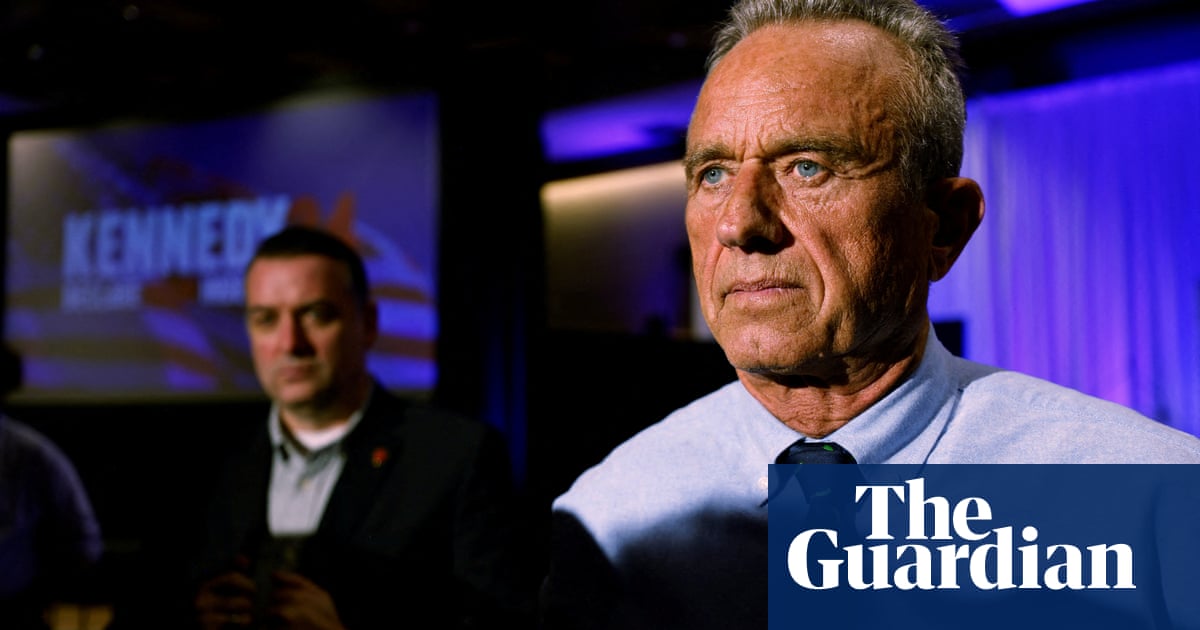
Hours after being endorsed by the third-party candidate Robert F Kennedy Jr, Donald Trump said he would release “all of the remaining documents pertaining to the assassination of John F Kennedy” if he were elected president in November, as part of a proposed new commission on presidential assassination attempts, including the one that targeted him.
Speaking at a rally in Glendale, Arizona, Trump also pledged that, if elected, he would “establish a panel of top experts” that would work with Kennedy, a prominent anti-vaccine advocate, to investigate childhood health problems. The 13 July assassination attempt on Trump is already being officially investigated, including by the Secret Service and the FBI.
Kennedy, the scion of one of the country’s most famous Democratic political dynasties, got a roar of approval from Republicans when he joined Trump onstage at a Republican campaign rally in Glendale, Arizona. “Bobby! Bobby!” the crowd chanted.
Kennedy had announced earlier on Friday that he was suspending his third-party campaign for president and endorsing Trump. Kennedy’s vice-presidential pick, Nicole Shanahan, had previously spoken out about the campaign’s belief that staying in the race would result in a victory for Harris, because “we draw votes from Trump”. Kennedy said he would remove himself from the ballots in swing states, where he might siphon electoral college votes from Trump, while staying on the ballot in other states.
In a brief speech at the rally, Kennedy said Trump would “make America healthy again” and that he would be a president “who is going to protect us against totalitarianism”.
In praising Kennedy for his support, Trump referenced Kennedy’s father, a Democratic US senator and attorney general, and his uncle, a Democratic president. “I know they are looking down right now and they are very, very proud of Bobby. I’m proud of Bobby,” Trump said.
Kerry Kennedy, one of RFK’s sisters, told a Washington Post reporter earlier in the day that her brother’s embrace of Trump was “obscene”, and said: “I think if he were alive today my father would have detested almost everything about Donald Trump.”
Trump’s vice-presidential pick, JD Vance, has recently been linked to a conservative group that advocates repealing the 1964 Civil Rights Act, an anti-discrimination law which was introduced by John F Kennedy and became law after his assassination.
In a joint statement before the Glendale Trump rally, five of Kennedy’s siblings – Kathleen Kennedy Townsend, Courtney Kennedy, Kerry Kennedy, Chris Kennedy and Rory Kennedy – called RFK’s endorsement of Trump “a betrayal of the values that our father and our family hold” and “a sad ending to a sad story.” They said they were supporting the Democratic ticket of Harris and Walz.
As temperatures exceeded 100F (38C) in Arizona, local news outlets reported that more than 100 people had been treated for heat exhaustion as they waited to get inside the Trump rally, with some getting medical treatment on site, and some being transported to a hospital.
Kennedy joined Trump in Glendale less than 24 hours after Arizona’s secretary of state confirmed that Kennedy’s campaign had officially requested to be removed from ballots in Arizona.
Election officials in Arizona and Ohio confirmed that Kennedy’s name will not be on the ballot in their states, and he is also listed as withdrawn from the race on the Texas secretary of state’s website. Kennedy’s campaign has also reportedly filed paperwork to remove his name from the ballot in Pennsylvania.
But in key battleground states of Michigan, Nevada and Wisconsin, election officials said it was too late for Kennedy to take his name off the ballot even if he wants to do so.
Trump’s suggestion that he would create a government panel of experts to work with Kennedy to investigate children’s health problems in the US is notable, given Kennedy’s track record.
In recent decades, Kennedy, an environmental lawyer, has become “among the most influential spreaders of fear and distrust around vaccines” and “has traveled the world spreading false information about the pandemic,” the Associated Press reported. His Twitter account was named as “the top superspreader” of misinformation about Covid-19 by a medical journal article in 2022. The Associated Press has investigated the consequences of Kennedy’s advocacy on individual families and “how Kennedy had capitalized on the pandemic to build [Children’s Health Defense, his advocacy group] into a multimillion-dollar misinformation engine”.
Kennedy has for years falsely claimed that vaccines cause autism, and more recently he has made series of other lurid health claims, including that wifi causes “leaky brain”, school shootings might be linked to antidepressants, and that chemicals in water were making children transgender.
Some Kennedy supporters said they found his endorsement of Trump frustrating, because they had been drawn to RFK Jr as an alternative to the two-party system, and because some were not willing to vote for Trump.
Kennedy, like Trump’s own vice-presidential pick, JD Vance, has previously savaged Trump publicly and privately. He reportedly called Trump “probably a sociopath”, “barely human” and “the worse [sic] president ever” in text messages, according to the New Yorker.
In 2020, Kennedy publicly called Trump a “bully” and said he had “discredited the American experiment with self-governance,” and more recently he called Trump’s criticism of him “unhinged”.
It went both ways: in May, Trump had attacked Kennedy in a social media post, Truth Social, calling Kennedy “junior” and labeling him “one of the most Liberal Lunatics ever to run for office”.
Trump references their past differences at the Glendale rally, saying, “He also went after me a couple times. I didn’t like it.”
Trump had praised Kennedy and said, contrary to the available evidence, that Kennedy would have defeated Joe Biden if he had stayed in the Democratic presidential primary, rather than deciding in October 2023 to launch an independent bid for the presidency.












